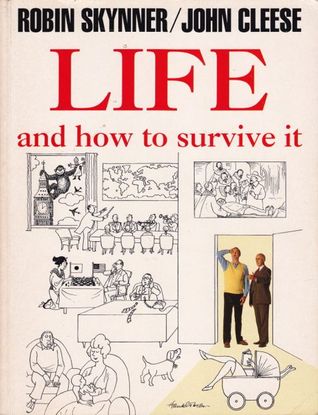¤ Robin Skynner & John Cleese: LIFE and how to survive it [1993]
The Price of Everything and the Value of Nothing – [excerpts]
Robin: …I like the idea of a Greek psychologist called Charis Katakis. She’s taken a word we’re familiar with –‘myth’– and given it a wider meaning. Roughly, she uses it to mean the ideas and stories that enable human beings to cooperate and work together as a society […]
John: So, as we try to construct our mental maps, we first use our experience, and then we supplement that with information from what Katakis calls myths. Then we´ll have a reasonably complete map which will guide us how best to fit in with others.
Robin: And also how to live a happy and fulfilling life.
John: Hang on, isn’t that two things? One about society, and the other about the individual.
Robin: Yes, but they’re very closely connected. We’ve agreed that a healthy society is one which makes possible the development of healthy individuals. The other side of the coin is: the more that people develop individually, the more they’ll be able to give back to society. So in looking at Katakis myths, we’ll expect them to have the two aspects: the first is to provide a basic structure for society, enabling people to live together with as much cooperation and harmony as possible; the second is concerned with the growth and maturing of the individual, enabling each person to understand and organize their life by finding a greater harmony within themselves.
John: Fair enough. But these Katakis myths . . . I mean, they extend all the way from scientific knowledge to fairy stories. Can you really call scientific knowledge a ‘myth’?
Robin: It fits this definition completely – abstractions that enable groups of people to cooperate in a common task. Also, although scientific knowledge is expressed in as unambiguous a way as possible, so that the maximum number of people can agree on what it means, philosophers of science have now shown very clearly that much of this ‘agreement’ is possible only because of shared perceptual habits within a particular culture; it’s these shared cultural perceptions that make certain assumptions seem ‘obvious’ or ‘commonsense’; but they’re really describing cultural habits, which are sometimes deeply ingrained and associated with strong emotions [. . .]

[bold types are mine]
Robin: … I think sports and games were much healthier for people when winning was kept in perspective. The old British ideas of ‘fair play’ and ‘good loser’ were thoroughly admirable ones, and came from a much more mature and integrated philosophy of life.
John: It’s suddenly occurred to me that we’ve been discussing all this without mentioning the huge increase in the amount of money that winning brings nowadays. Perhaps ‘money’ is the value I should be asking you about above all others. It’s a huge aid to social cooperation, yet, […] it seems to me fundamentally morally neutral. I mean by that simply that it facilitates the exchange of goods, without being exactly good or bad in itself. Yet there are a million myths about it, and an enormous amount of people’s values and behaviour are determined by it. How do you see the different levels of mental health interpreting good old amoral money . . . ?
Robin: It’s a huge subject. But let’s look at it in the light of the three indicators of health we’ve already discussed. First, unusually healthy people see the world very clearly and realistically. So they are more likely to see exactly what money is – it’s a means of getting the things you need to give you the life you’ve decided will satisfy you best. And healthy people will be clearer about what’s really satisfying too, so they’ll have a pretty accurate idea of how much money they need. And they won’t be likely to waste much time on making more than that!
John: So people are not behaving healthily if they spend a lot of time acquiring more money than they really need.
Robin: No.
John: . . . Well if they do, it must be because of the symbolic value that money has for them.
Robin: That’s right. For some people, money is primarily a symbol of their power or status – their position in the hierarchy; for some, especially a certain kind of Puritan, possession of it combéis actual moral Brownie points; and for some who’ve suffered from real poverty in their earlier lives it’s symbolic of security against a return to that deprived state. And it’s not just a question of financial poverty. For many people who have lacked love and emotional security in childhood, money comes to be a substitute, a source of security and gratification over which they can have complete control. It’s one reason many people never feel they have enough; it never meets the real need, which is emotional.
John: Are there any specifically psychiatric insights into the compulsive accumulation of money that you’ve found particularly interesting?
Robin: I’ve never come across a person like that who was happy!
John: So is it fair to say that the more a person search for money is compulsive, and based on some symbolic value they’re unaware of, the lower the level of mental health they’re manifesting?
Robin: Yes, I’d accept that.
John: So that’s money looked at from one aspect of health – realistic perception. What’s the second aspect that sheds light on Lucre?
Robin: Our old friend, ‘integrity’. This simply means that healthy people will apply the same values to the Money – making part of their lives as they do to their personal lives; they won’t treat them as separate compartments.
John: So the cynical ‘Business is Business’ attitude won’t apply?
Robin: No, even if the workplace sometimes feels a bit fierce, the healthier people will try to hang on to their values.
John: But there are always a few really nasty people out there in the business world, aren’t there? I’ve met two myself…
Robin: Plenty of them. But remember that ‘healthies’ are realistic. They’ll take all necessary precautions if they have to deal with somebody they judge to be unscrupulous – but that’ll be true of the rest of their lives too.
John: Nice to think some of the best medieval attitudes are still around. And what’s the third measure of health that illuminates attitudes towards money?
Robin: The most obvious one – the Affiliative Attitude. Healthier people will be generous with any money they have to spare, spreading it round in rather the same way as they spread their warmth and friendliness and goodwill.
John: It’s interesting, isn’t it?, that there’s such a dislike of someone who won’t stand their round of drinks! But I guess people intuitively sense that it reveals a person’s deeper attitude towards their friends.
Robin: Behaviour like that usually reflects a general tendency, doen’t it? If it’s persistent, it’s likely to show in other aspects of the person’s behaviour . . .
 ¤ Afterthought: The end?
¤ Afterthought: The end?
John: I know a doctor who says that he’s never seen anyone on a deathbed yet who has confessed. ‘I wish i’d spent more time at the office.’
Robin: Wonderful! So, around this age, we begin to feel there must be something more, but we can’t see what it is.
John: So is this the essence of the ‘mid-life crisis’? The first half hasn’t seemed all that long, you feel you’ve wasted a lot of time, you’re not very satisfied with what you’re doing now either, and life suddenly feels very short? And you don’t know what to do about it . . .
Robin: That’s why we feel depressed. It’s a healthy reaction, a sign that we are re-drawing our map of the world, changing our values. And if all goes well at this stage, our disillusionment with the conventional stereotyped values we’ve been operating on leads to a turning back towards the inner world, and the deeper, unchanging satisfactions of life: exploring more deeply our relationships with people; attending much more to nature, beauty, art; and getting more interested in spiritual teachings and what they tell us about the meaning and purpose of life. Of course, we don’t lose what’s real in our education and experience. Our knowledge, skills, social competence and ability to do useful work and earn our living are all still useful. Bu we come back more and more to a strong inner life, where we become interested in exploring things and parts of ourselves that up to now we’ve neglected. We begin to do things that we personally value rather than things we feel we ought to.
* * *
“Immature love says: ‘I love you because I need you.’ Mature love says ‘I need you because I love you.” ― Erich Fromm (1900-1980)
thanks for the share.http://www.bolsasfeminina.com
That is very attention-grabbing, You’re an overly professional blogger. I have joined your feed and look ahead to in search of more of your magnificent post. Also, I’ve shared your site in my social networks
This is exactly a very good read in my view, Must admit that you are one of the ideal bloggers I ever saw.Many thanks for publishing this useful article.
Regards for all your efforts that you have put in this. very interesting info .
But wanna remark that you have a very decent web site , I the design and style it actually stands out.
You have observed very interesting details ! ps decent website .